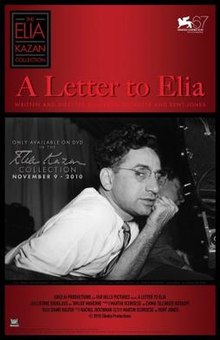I have not seen as many Elia Kazan films as I’d like too – so far, I’ve only really watched his two classic starring Marlon Brando, “A Streetcar Named Desire” and “On the Waterfront”. I saw “East of Eden” too, but I was so disappointed that the film version skipped over 3/4 of the John Steinbeck novel, which I’d just read, that I couldn’t appreciate it fully. Now, I definitely want to revisit it, and I’m also dying to dive into the rest of Kazan’s filmography…
I guess that’s the best thing that can be said about Martin Scorsese‘s “A Letter to Elia”: it really makes you want to watch these pictures. I’ve long said that a film critic should make you feel how passionate he or she is about cinema and on that basis, Scorsese has got to be one of the best film critics in the world, even though it’s not his day job. As he did previously in the documentaries “A Personal Journey with Martin Scorsese Through American Movies” and “My Voyage to Italy”, Marty dissects some of the films that have had the biggest impact on him, not only going into technical analysis and historical context but, most importantly, telling us why these movies matter so much for him.
As such, “A Letter to Elia” is as much, if not more about Scorsese as it is about Kazan. We see a lot of clips from the latter’s movies, plus archival images, excerpts from an interview and quotes from the filmmaker’s autobiography read off-screen by actor Elias Koteas. But most of the time, we’re listening to Scorsese, sometimes talking directly to the camera, as he shares his feelings about Kazan’s work and how deeply it affected him through his life.

In 1954, as a kid who found refuge either in church or at the movies, Scorsese discovered “On the Waterfront” and it made something click in him. He recognized the faces, bodies and voices in it as those of the people he saw everyday, and he was amazed to discover how art could be made out of their world, out of all that toughness and tenderness… The next year, he stalked “East of Eden” from one theatre to another through New York, so fascinated he was with the film, which awoke feelings in him he didn’t even know he had. In praising these and other Kazan directorial efforts, Scorsese speaks to the notion that some films can understand you better than the people around you, detailing the secret relationships we have with the formative pictures in our life…
“A Letter to Elia” touches briefly on the major events in Kazan’s life, notably the controversy surrounding his testimony before the House Committee on Un-American Activities. But that’s not what Scorsese is really interested in in this very personal piece. He doesn’t dwell either on the relationship he had with Kazan once he became one of his peers, up until the last few years of his life and the 1999 Oscars ceremony during which he presented him with a Lifetime Achievement Award
Again, what truly matters is what Kazan’s films meant to him, how they gave him “the desire and the confidence” to start making his own movies. If only for that, we should be grateful to Elia Kazan. Because the work of Martin Scorsese has certainly meant a lot to me in my life, as it undoubtedly has in countless others; “Taxi Driver” was pretty much to me what “East of Eden” was to him…

Posted on October 4, 2010January 3, 2014Author KevinCategories Movie Reviews

